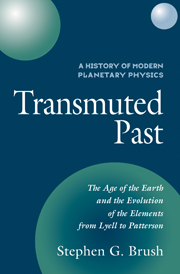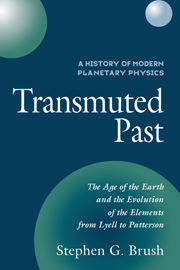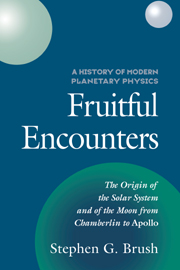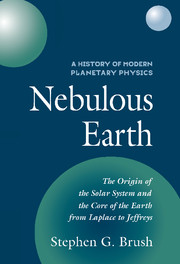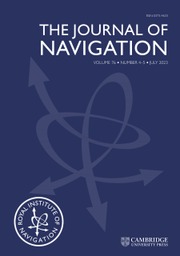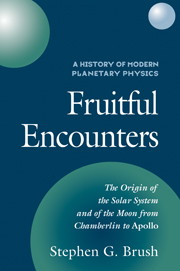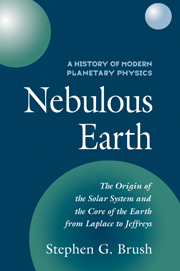A History of Modern Planetary Physics 3 Volume Hardback set
Where did we come from? Before there was life there had to be something to live on - a planet, a solar system. During the past 200 years, astronomers and geologists have developed and tested several different theories about the origin of the solar system and the nature of the Earth. Did the Earth and other planets form as a byproduct of a natural process that formed the Sun? Did the solar system come into being as the result of a catastrophic encounter of two stars? Together, the three volumes that make up A History of Modern Planetary Physics present a survey of these theories.
Nebulous Earth follows the development of Laplace's Nebular Hypothesis, its connection with ideas about the interior of the Earth, and its role in the establishment of the 'evolutionary' worldview that dominated science in the latter part of the nineteenth century. Brush also explores Saturn's rings, Poincaré's contributions to ideas about cosmic evolution, the use of seismology to probe the Earth's core, and explanations of the Earth's magnetic field.
- No other book covers theories about the origin of the solar system as comprehensively
- Writing is accessible to non-specialist readers
- Includes the results of the space program and the recent changes in the ideas about the origin of the Moon
Reviews & endorsements
'One stands in awe at the amount of scholarship recorded in these volumes … This major work of reference should be in all university and public libraries, as well as in departmental science libraries. It will remain an important document as long as planetary science is practised.' Stuart Ross Taylor, Nature
'… this work is useful in offering many new and interesting perspectives on the development of ideas in Earth science and cosmology.' M. Woolfson, Physics World
'No set of astronomy textbooks is complete without at least one on the subject's history, and the three-volume set A History of Planetary Physics by Stephen Brush is destined to be a classic.' David Hughes, New Scientist
'Part one of the first book in the series, Nebulous Earth, is an excellent account of the development of the most popular theories to explain the solar system, and the composition of the Earth from the 17th century to the 19th century … These three volumes give a very interesting overview of the historic development of theories beginning with the 17th century and ending in the 1980's, which have led to our present day understanding of the possible processes that have been involved in the formation of our solar system including Earth.' R. Harrison, Open University Geological Society
' … can be highly recommended as a reference on the history of plantogonies.' Dr K. Regenauer-Lieb, Meteorite
'Nebulous Earth, is an excellent account of the developemtn of the most popular theories to explain the solar system, and the composition of the Earth from the 17th century to the 19th century.' OUGS Journal
'These three volumes give a very interesting overview of the historic development of theories beginning with the 17th century and ending in the 1980s, which have led to our present day understanding ofthe possible processes that have been involved in the formation of our solar system including Earth.' Open University Geological Society Journal
'Brush has included a very comprehensive bibliography, his books are well produced, and his work will long stand as a major contribution to the history and understanding of an important endeavour of the human mind and spirit.' Alan Cook, Journal for the History of Astronomy
Product details
August 1997Multiple copy pack
9780521552158
324 pages
243 × 162 × 56 mm
1.768kg
11 b/w illus.
Unavailable - out of print
Table of Contents
- Part I. Nebular Birth and Heat Death:
- 1. Introduction
- 2. The founders: Laplace and Herschel
- 3. Followers and critics
- 4. The Nebular Hypothesis and the evolutionary worldview
- 5. Thermodynamics and the cooling earth
- 6. Saturn's rings
- 7. Revisions of the Nebular Hypothesis 1860-1885
- 8. Poincaré and cosmic evolution
- 9. The Nebular Hypothesis in the 20th Century
- Part II. Inside the Earth:
- 10. Introduction
- 11. 19th Century debates: solid, liquid, or gas?
- 12. Discovery of the core
- 13. Chemical history of the core
- 14. Theories of geomagnetic secular variation.


